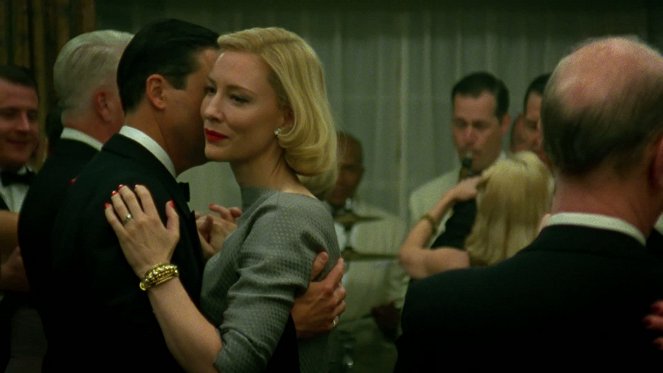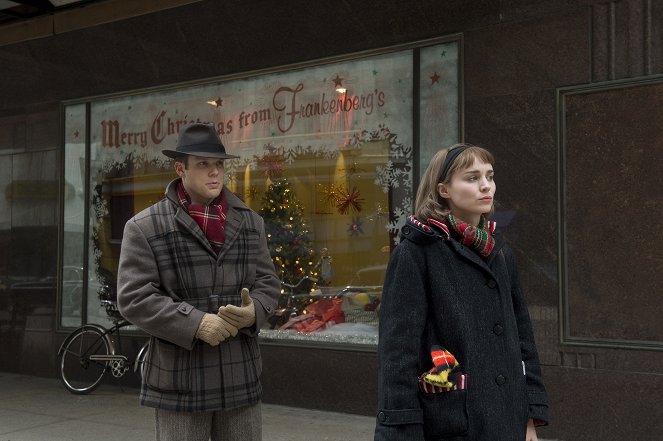Réalisation:
Todd HaynesScénario:
Phyllis NagyPhotographie:
Edward LachmanMusique:
Carter BurwellActeurs·trices:
Cate Blanchett, Rooney Mara, Kyle Chandler, Jake Lacy, Sarah Paulson, Cory Michael Smith, Carrie Brownstein, John Magaro, Ken Strunk (plus)Résumés(1)
Set in 1950s New York, CAROL tells the story of Therese Belivet (Rooney Mara), a young woman in her 20s working as a clerk in a department store who meets Carol (Cate Blanchett), an alluring woman trapped in a loveless, convenient marriage. While Carol breaks free from the confines of marriage, her husband (Kyle Chandler) begins to question her competence as a mother as her involvement with Therese and close relationship with her best friend Abby (Sarah Paulson) come to light. (Entertainment One)
(plus)Vidéo (24)
Critiques (7)
Belle caméra et musique. Cependant, l'histoire du couple central est ennuyeuse tant sur le plan psychologique que sexuel. C'était comme regarder le coucher de soleil à travers du plastique parfaitement poli. Sur les chaises en bois folles de l'Obecný dom (film d'ouverture du festival), c'était une souffrance.
()
Défi cinéma en situation de confinement – actrices préférées : Rooney Mara. Dans le cadre de mon défi, j’ai, sans m’en rendre compte, engagé un duel de sœurs entre Kate Mara et Rooney Mara dans des films traitant de la thématique lesbienne. Et sans aucun doute, c’est Kate Mara qui l’emporte. Dans Carol, même si la prestation de Rooney est tout à fait excellente, le film a tendance à patiner et à prendre son temps de façon exagérée, à se diluer, à susciter l’ennui. Certaines longues prises ont leur signification et établissent une ambiance appropriée, mais pour le reste, on se noie dans des futilités. À côté de Rooney, la prestation de Cate Blanchett est, comme il se doit tout aussi impeccable, celle-ci interprétant son rôle avec énormément de justesse.
()
Strong acting, masterfully directed and written, but for me it falls into the category of predictable queer drama with everything that it encompasses, including very stenciled emotions. A model American melodrama that deservedly receives acting awards, but at the same time a film that ends only with realization bravado. Cold, forgetful, over-cultivated - at least that's how it felt to me during this year's Cannes competition.
()
Carol is a movie that’s based solely on the acting performances of Cate Blanchett and Rooney Mara. They both act exactly the way they need to. Cate is beautiful, dominant and exactly knows what she wants. Rooney is beautiful, quiet and her there’s a battle going on in her heart. But if it weren’t for one faint mention of the Czech Republic, there wouldn’t really be any significant reason for me to listen to the dialogues.
()
In terms of style, Carol is perhaps Todd Haynes’s "straightest" film. Far From Heaven was rather more a meta-commentary on Douglas Sirk’s melodramas than a pure, absorbing and universal love story. In my opinion, Carol is a mature work by a director with a sense of humility toward both the story the and actresses depicting who doesn’t need to prove anything to himself or the audience (yes, I’m looking at you, Alejandro). With its purifying simplicity, behind which you feel the long consideration put into every shot, it reminded me of Lean’s Brief Encounter. In Carol, we also begin with one of the last scenes (which we see from a completely different perspective at the end), the points of view of the two lovers are also taken into equal consideration and their love is of the forbidden, socially unacceptable kind. However, the protagonists have to hide their emotions even more cautiously than the lovers in Lean’s film. Their relationship is perceived as obscene not only morally, but also legally, which enriches the narrative with the elements of a crime story. Therese and Carol must limit their interactions to fleeting touches, timid glances into each other’s eyes and outwardly innocent conversation. Their position in the shot, the settings in which they find themselves, the objects that complement them (or prevent us from seeing them better) often reveal more to us. This is probably why many find the film academically cold and detached. I would rather choose the words “subtle” and “restrained” – the film is not built on grand emotions and contrived plot twists, but on the small gestures and glances through which Carol and Therese communicate with each other, for lack of any other vocabulary, to the point where they can no longer return to their previous identities and no longer pretend to be someone else. Thanks to what is felt but not expressed, the film does not lack a dramatic or erotic tension, which would be unattainable with greater explicitness. In the search for relationship balance, Haynes meaningfully combines several minor motifs (the car ride, a symbol of the protagonists’ enclosed microcosm and their unfulfilled desire for freedom, security and gaining power over perspective and representation through photography) and supporting characters, not one of which ultimately gives Carol and Therese an excuse to verbalise their feelings. Like The Duke of Burgundy, Carol is not only about a lesbian relationship. Probably everyone who has ever been in love has experienced the same uncertainty about how to express feelings for which they don’t have words. 85%
()



Annonces